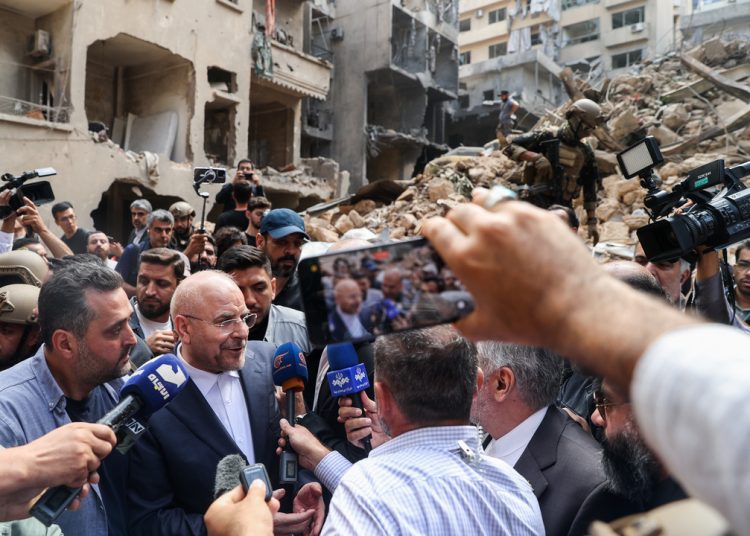As Hezbollah recovers from the initial shock and confusion following the loss of its key leaders and commanders, Iran’s high-ranking officials are visiting Beirut to boost the group’s morale and show solidarity amid external pressure.
Mohammad Bagher Ghalibaf, the Speaker of the Iranian Parliament, made an unforeseen visit to Beirut on Saturday despite the recent Israeli bombings. As the pilot, he personally landed a plane on the runway of Beirut International Airport, with smoke from the bombings visible in the background, creating a powerful and symbolic image of his trip. His visit to the neighborhood hardest hit by the Israeli airstrikes in recent weeks turned into a notable event for Iran and its supporters, garnering widespread media attention and even praise from his political critics at home. Observers noted this as a demonstration of his courage and timely action amid the recent escalation in the region.
During his visit, Ghalibaf toured residential buildings in Beirut that had recently been bombed by Israel, providing a significant morale boost to the residents and Hezbollah forces. He conveyed a message from Iran’s Leader Ayatollah Ali Khamenei to the people, government, and resistance forces of Lebanon, emphasizing solidarity and support during these challenging times.
Ghalibaf met with Lebanon’s Prime Minister Najib Mikati and Speaker of Parliament Nabih Berri to discuss the country’s situation and recent developments. These meetings followed phone calls between US Secretary of State Anthony Blinken and the Lebanese leaders the previous day. In a post apparently referencing the content of these phone calls, Ghalibaf’s adviser, Mahdi Mohammadi, remarked, “The enemy cannot achieve at the negotiating table what it failed to achieve on the battlefield.”
Despite the dangers of ongoing Israeli airstrikes, Ghalibaf’s visit, following that of Foreign Minister Abbas Araghchi, marked him as the second highest-ranking Iranian official to travel to Beirut during this period of heightened tensions. His presence in the bombed areas was seen as a message of defiance against Israeli threats. Some social media users compared his visit to the secretive trips of US presidents and officials to conflict zones or countries such as Iraq and Afghanistan, highlighting the courage of Iranian officials to make their visits in the light of the day.
This trip occurred amid Israel’s threats to retaliate against Iran’s recent missile attacks. Meanwhile, Iran’s President Masoud Pezeshkian traveled to Qatar and Turkmenistan, and the Iranian leader attended public meetings, including the recent Friday prayer in Tehran. Iran’s foreign minister also visited Saudi Arabia and Qatar and planned a trip to Iraq. Ghalibaf had previously traveled to Tajikistan. These actions by Iranian authorities aim to bolster their allies and discredit Netanyahu’s ‘madman’ strategy.
Observers in Iran believe Israel has tried to mask its losses in Gaza with psychological and terror operations over the past month, trying to have the upper hand in the game. They see it as essential to humiliate Israel by the symbolic moves and revive the spirit of resistance. Amid increasing international pressure and Lebanon’s economic and political challenges, this visit demonstrated Iran’s commitment to supporting its allies against foreign threats, reinforcing the message that Iran stands firm with its partners in the region.
The new stage of escalation between Israel and Lebanon began when several Hezbollah officials were assassinated and Israel carried out massive strikes on Beirut. Recent events indicate that Hezbollah is recovering from the initial shock and confusion caused by the loss of its key leaders and commanders. This recovery is evident in their sustained and increased rocket fire, the use of new missiles, and the expansion of the scope of their targets within Israel.
Iranian officials have sought to bolster Hezbollah’s spirits and mitigate the attacks on Lebanon and Gaza through their visits to Beirut. During a recent trip, Iran’s foreign minister expressed Tehran’s support for a simultaneous ceasefire in Gaza and Lebanon, contingent on acceptance by the resistance forces.
The axis of resistance, including Hezbollah, has not supported decoupling the Lebanon front from Gaza. Consequently, the conflict in the south and east is expected to continue. This has been the case in recent days and the Israeli attacks on southern and eastern Lebanon have intensified.






